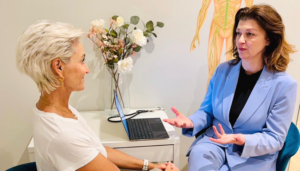The average age for Menopause in the UK is 51, with 5% of women going through Menopause from 40-45 and 1% before the age of 40. It may sound daunting, but Menopause is a normal and natural part of women’s lives. Understanding the stages of Menopause means you can be better prepared for when it happens.
Perimenopause Stage
Perimenopause is the period leading up to menopause, usually beginning around age 45 or so. During this time, hormonal fluctuations are common, as is irregular menstrual bleeding. Mood swings also tend to increase during perimenopause due to fluctuations in hormones.
Menopause Stage
Menopause begins once a woman has not had her regular period for 12 consecutive months. This marks the end of fertility for most women. However, some may experience occasional menstrual cycles during menopause.
Hot flushes, night sweats, insomnia, and vaginal dryness are common during this stage of the menopausal transition. These symptoms tend to last anywhere for five years on average but can vary widely from person to person depending on their individual hormone levels and lifestyle.
Postmenopausal Stage
Once a woman has gone 12 consecutive months without her period, she is considered postmenopausal. During this stage of the menopausal transition, hormone levels will continue to fluctuate but should gradually become more stable over time with fewer hot flushes and other menopausal symptoms. That being said, this varies widely from woman to woman.
Women may still experience changes in mood or sleep patterns due to hormonal changes. It’s important for women approaching postmenopausal age to consult with their doctor about what steps they can take to help ensure their health during this new phase of life.
Menopause is a natural part of life for women everywhere—and it doesn’t have to be something we dread or fear! With knowledge of the three phases, we can reduce stress and be confident in our journey through menopause.
Armed with the knowledge and support from your doctor or healthcare provider, you can navigate through each stage feeling confident in your body’s abilities.
Further Reading
Learn more about common menopausal symptoms and our introductory guide to treating menopausal symptoms.
You can learn more about menopause at the British Menopause Society, the National Institute for Health and Care Excellence and the NHS.
This article was written as a guide and did not substitute medical advice. Please consult your doctor about any medical issues or for guidance on treatment options.

📍 Our Menopause GP service in Wimbledon, London, empowers women to take charge of their lives, introducing them to the evidence-based resources they need so that this stage can be an inspiring period full of potential.
Error: No feed with the ID 3 found.
Please go to the Instagram Feed settings page to create a feed.
April 9th 2024
We have put together simple strong strength and conditioning exercises strong you do can at the gym Adding these tried and tested exercises to your regime for minutes a day really can make all the difference to your overall strength and core stability As well as playing a crucial role...
READ MOREApril 9th 2024
Regardless of the type of delivery you have had your body can feel sore and painful for many reasons Sometimes Post-Pregnancy Physiotherapy is provided in hospitals However if you have a home birth or are discharged early you may not be lucky enough to see a physiotherapist This article explores...
READ MOREApril 9th 2024
In a situation of a sudden musculoskeletal injury the body has several ways of dealing with the new imposed stress The physiological processes of healing are quite complex but we can generally describe them in three stages strong Inflammation Repair and Remodeling strong In this article we outline the core...
READ MORE